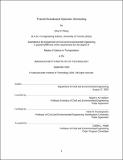Transit extraboard operator scheduling
Author(s)
Wang, Qing Yi,S.M.Massachusetts Institute of Technology.
Download1227048955-MIT.pdf (5.290Mb)
Other Contributors
Massachusetts Institute of Technology. Department of Civil and Environmental Engineering.
Advisor
Nigel H. M. Wilson and Haris N. Koutsopoulos.
Terms of use
Metadata
Show full item recordAbstract
In addition to operators who pick scheduled service duties, transit agencies have a separate group of operators to cover work that becomes open due to absence or other unexpected situations. This group of operators are referred to collectively as the extraboard. Another way to cover the open work is through operator overtime. Therefore, a central challenge of the extraboard planning problem lies in the uncertainty of the amount of the work that will need to be covered, as well as the extent of operators' willingness to work overtime. Due to the critical importance of service reliability, transit agencies seek a systematic approach to schedule extraboard operators to minimize a weighted cost of lost service, overtime, and extraboard operators. This thesis proposes a methodology that systematically addresses the extraboard scheduling problem, focusing on a case study using data from the Massachusetts Bay Transportation Authority (MBTA). The methodology has two components: demand (absence) estimation and schedule optimization. Absence can be classified as known-in-advance or unexpected, based on both when they are known and the way they are covered. Two negative binomial regression models were formulated based on their different characteristics. Among the variables tested, no significant predictive relationships were found with respect to absences, overtime, or lost service. The resulting models mainly reflect the average behavior on each day of the week. Multi-stage integer optimization programs were constructed to schedule the extraboard operators. Given the current extraboard size, assignments given by different modelling strategies were similar. When the staffing level constraint was relaxed, compared to deterministic models, the robust solutions achieve more stable level of lost service and overtime, while being less sensitive to model parameters. However, the robust solutions are of higher financial costs to the MBTA, since they included more fixed financial costs from the extraboard operators and less variable costs from overtime and lost service. Therefore, without improvements in the input estimations, decision of extraboard size depends on the tradeoff between financial costs and service reliability. This thesis contributes to the literature by quantitatively studying operator absence, introducing robust optimization for the extraboard planning problem, and demonstrating the use and the advantages of a systematic assignment procedure.
Description
Thesis: S.M. in Transportation, Massachusetts Institute of Technology, Department of Civil and Environmental Engineering, September, 2020 Cataloged from student-submitted PDF of thesis. Includes bibliographical references (pages 144-147).
Date issued
2020Department
Massachusetts Institute of Technology. Department of Civil and Environmental EngineeringPublisher
Massachusetts Institute of Technology
Keywords
Civil and Environmental Engineering.